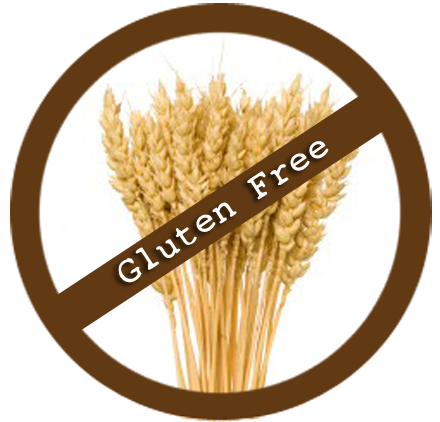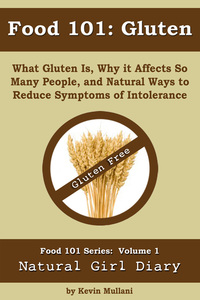Understanding Gluten |
What is Gluten? |
|
|
What is Gluten?
Gluten is a protein composite found primarily in the grains of wheat, barley, and rye. Less commonly known relatives of wheat such as spelt, triticale, kamut, farro, and einkorn also contain gluten. Oats are inherently gluten-free; however, most commercially available oats are contaminated with gluten-containing grains during the growing, transportation, and milling processes. List of ingredients to avoid if on a Gluten-Free Diet here. Why is Gluten a Problem? Studies indicate that gluten sensitivity may be one of the most under-diagnosed disorders in the medical field, hinting that as much as 40% of the population may be suffering from gluten-related problems (healthmedicalnow, 2011). So why has gluten related health problems become such a big deal lately? |
One reason is that wheat grown by our ancestors as little as 50 years ago contained significantly less gluten than wheat grown today. According to Adams (2011), “the hybridization and genetic engineering of wheat has resulted in a staggering 500 fold increase in the gluten content of modern day wheat compared to the wheat our forefathers would have known”. There is little doubt that this is one of the prime reasons behind the significant increase of gluten intolerance and celiac disease cases in recent decades.
What Happens When We Eat Gluten?
Normal gluten digestion begins in the mouth when saliva interacts with food and starts to break it down. When gluten enters the stomach, digestive enzymes attempt to break the protein down further into individual components such as gliadin and glutamine. The gluten components however, are undigestible in large quantities and act much like stones in a river, eroding away the important villi of the small intestine.
The undigested gluten peptides also create holes between the villi fingers and cross through the defensive barrier of the intestine where they shouldn’t be. Once these particles start passing through the holes, the body sees them as “invaders” similar to bacteria or virus and attacks them, along with the surrounding tissue.
Over time, severe damage can be done to the small intestine which is typical in people who suffer from celiac disease. Those who suffer from gluten sensitivity may not have significant damage to the small intestine, but the undigested gluten peptides still wreak havoc inside the digestion tract causing many other problems.
Are You Gluten Sensitive?
Gluten sensitivity may be the hardest condition to diagnose accurately. Both the blood tests that detect high levels of anti-bodies and allergic reaction tests may produce negative results, despite what you know you have experienced from eating wheat. This may trigger traditional doctors to prescribe medications to relieve the symptoms without ever determining the actual cause. If that happens, then it will be up to you to make the final determination. Symptoms vary greatly among those who suffer from it, but some of the most common symptoms are:
Gluten sensitivity may be the hardest condition to diagnose accurately. Both the blood tests that detect high levels of anti-bodies and allergic reaction tests may produce negative results, despite what you know you have experienced from eating wheat. This may trigger traditional doctors to prescribe medications to relieve the symptoms without ever determining the actual cause. If that happens, then it will be up to you to make the final determination. Symptoms vary greatly among those who suffer from it, but some of the most common symptoms are:
|
bloating
abdominal discomfort pain or diarrhea |
headaches and migraines
attention deficit disorder muscular disturbances |
lethargy and tiredness
hyperactivity bone and joint pain |
One of the most common ways you can determine if you are sensitive to gluten is to completely eliminate it from your diet for 2-6 weeks. Plan appropriately for this endeavor with a meal plan and shopping list as this will greatly increase your chances of sticking to the test. Throughout the test period you should keep a food journal to log how your health changes. Once your test period is over, begin to slowly reintroduce gluten products back into your diet. Again, the food journal will help you track any symptoms that may return because of the gluten.
Proactive Steps to Improve Digestion and Improve Gluten-Related Symptoms
There are 3 critical areas of the digestive system that can help process gluten and improve your digestion system.
1. Ensure proper levels of hydrochloric acid in the stomach
If you can determine you have low hydrochloric acid production, add foods rich in vitamin C to your diet. Fruits and vegetables such as apples, oranges, kiwis, strawberries, cauliflower and cabbage are all great additions to get more vitamin C.
2. Properly utilize natural digestive enzymes
Ginger is a great root to add to your meal plan, especially when you eat meat. Ginger contains a protein-digesting enzyme called zingibain, which is ridiculously good at doing its job. “One gram of zingibain can actually tenderize as much as twenty pounds of meat” (Young, n.d.). Ginger also increases the activity of other digestive enzymes and the source of ginger’s hot and spicy flavor, gingerols, stimulate bile flow. Finally, the essential and aromatic oils in ginger work in conjunction with gingerols to protect the lining of the stomach and reduce gas. Talk about a super food!
3. Balance the intestinal flora
Eating yogurt with live-cultures can be a good source of probiotics. When looking for a good yogurt, be sure the label states that it is “live culture” as pasteurization kills the probiotic organisms. One favorite yogurt of Natural Girl Diary is S.O. Yogurts, which are coconut based and contain live cultures.
There are 3 critical areas of the digestive system that can help process gluten and improve your digestion system.
1. Ensure proper levels of hydrochloric acid in the stomach
If you can determine you have low hydrochloric acid production, add foods rich in vitamin C to your diet. Fruits and vegetables such as apples, oranges, kiwis, strawberries, cauliflower and cabbage are all great additions to get more vitamin C.
2. Properly utilize natural digestive enzymes
Ginger is a great root to add to your meal plan, especially when you eat meat. Ginger contains a protein-digesting enzyme called zingibain, which is ridiculously good at doing its job. “One gram of zingibain can actually tenderize as much as twenty pounds of meat” (Young, n.d.). Ginger also increases the activity of other digestive enzymes and the source of ginger’s hot and spicy flavor, gingerols, stimulate bile flow. Finally, the essential and aromatic oils in ginger work in conjunction with gingerols to protect the lining of the stomach and reduce gas. Talk about a super food!
3. Balance the intestinal flora
Eating yogurt with live-cultures can be a good source of probiotics. When looking for a good yogurt, be sure the label states that it is “live culture” as pasteurization kills the probiotic organisms. One favorite yogurt of Natural Girl Diary is S.O. Yogurts, which are coconut based and contain live cultures.
|
Natural Girl Diary has written it's first book!
The article above was based completely on the research completed to write Food 101 - Gluten, and is just a taste of what you can find inside. The first in the Food 101 series, its purpose is to help bring clarity to an increasing phenomenon, gluten-related health problems. Whether you are just beginning to explore whether or not you may be gluten sensitive, or you have been living with intolerance for years, you will find useful information in this 30 page ebook. When finished reading the book, you will have a thorough knowledge of what gluten is, why it affects so many people, and ways to naturally reduce some of the common symptoms associated with gluten. Available Now on Amazon! |



